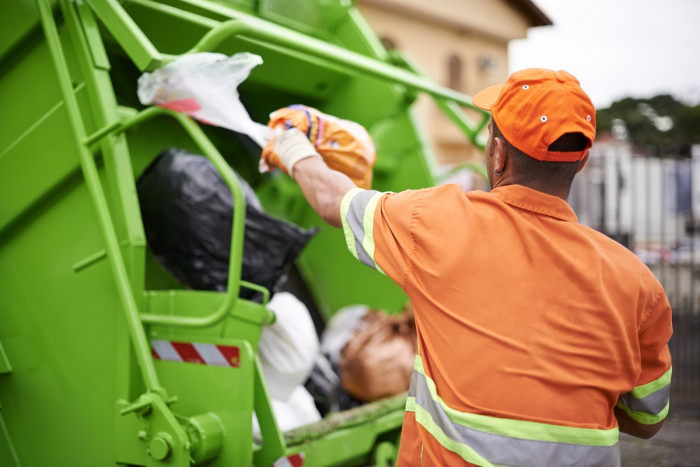Rubbish/Recycling Collector
Kaiwhakahiato Rāpihi
Alternative titles for this job
Rubbish/recycling collectors collect household, industrial or commercial rubbish for disposal or recycling.
Pay
Rubbish/recycling collectors usually earn
$24 per hour
Source: careers.govt.nz research and Northland Waste, 2020.
Job opportunities
Pay
Rubbish/recycling collectors usually earn between minimum wage and a little more, depending on where they work.
Owner-drivers earn more, but they have to pay for costs such as vehicle maintenance.
Sources: careers.govt.nz research, 2020; and Northland Waste, 2020.
- PAYE.net.nz website – use this calculator to convert pay and salary information
- Employment New Zealand website - information about minimum wage rates
(This information is a guide only. Find out more about the sources of our pay information)
What you will do
Rubbish/recycling collectors may do some or all of the following:
- drive or ride on a rubbish/recycling truck
- pick up bags or bins of rubbish/recycling and throw them into the truck
- operate machines to pick up bins
- separate rubbish from recycling
- operate equipment that crushes rubbish and items for recycling
- unload and clean rubbish/recycling trucks
- drive forklifts or vehicles with tracks or rollers.
Skills and knowledge
Rubbish/recycling collectors need to have knowledge of:
- collection routes
- what they should or should not collect
- health and safety guidelines
- correct lifting and carrying techniques
- how to operate rubbish compactors and other types of rubbish/recycling collection vehicles.
Ability to drive a heavy vehicle, forklift or vehicle with tracks or rollers is also useful.
Working conditions
Rubbish/recycling collectors:
- work irregular hours, including early mornings
- work outdoors on suburban streets and in commercial and industrial areas
- work in most types of weather, and in conditions that may be dirty, messy and smelly.
Entry requirements
There are no specific requirements to become a rubbish/recycling collector.
To become a rubbish/recycling truck driver, you need to have a heavy vehicle driver's licence.
To become a forklift driver, you need a licence with an F endorsement.
- New Zealand Transport Agency website - information on heavy vehicle licences
- New Zealand Transport Agency website - information on F, R, T or W endorsements
- Worksafe New Zealand website - information on training for forklift operators
Secondary education
There are no specific secondary education requirements to become a rubbish/recycling collector.
Personal requirements
Rubbish/recycling collectors need to be:
- practical, with an eye for detail
- quick and efficient
- punctual.
Useful experience
Useful experience for rubbish/recycling collectors includes physical labour or driving heavy vehicles.
Physical requirements
Rubbish/recycling collectors need to have a good level of fitness and must be strong.
Check out related coursesWhat are the chances of getting a job?
Regular vacancies for rubbish/recycling collectors due to high staff turnover
Rubbish/recycling collector vacancies arise regularly because staff turnover is high due to the early hours and hard physical work. However, vacancies are limited by the small size of the industry.
According to the Census, 615 rubbish/recycling collectors worked in New Zealand in 2018.
Increasing importance of recycling creates demand for rubbish/recycling collectors
There is good demand for rubbish/recycling collectors for kerbside recycling for residential households and businesses for local councils, and for providing specialist recycling collections for industrial companies.
An increasing demand for clean, sorted waste could increase the demand for recycling collectors.
Councils and waste management businesses biggest employers
Most rubbish/recycling collectors work for city and regional councils or waste management companies.
Some rubbish/recycling collectors are self-employed and work as owner-drivers, contracting their services to waste management businesses.
Sources
- Auckland Council, 'Waste Essential Services Continue', 6 May 2020, (www.ourauckland.aucklandcouncil.govt.nz).
- Nisbet, R, branch manager, contracts, Northland Waste, careers.govt.nz interview, May 2020.
- Sage, E, minister for conservation and land information, associate minister for the environment,'Speech to WasteMINZ conference 2019', 25 September 2019, (www.beehive.govt.nz).
- Stats NZ, '2018 Census Data', 2019.
(This information is a guide only. Find out more about the sources of our job opportunities information)
Progression and specialisations
Rubbish/recycling collectors may move into management roles or into operating machinery or driving heavy vehicle jobs.
Last updated 28 March 2025

